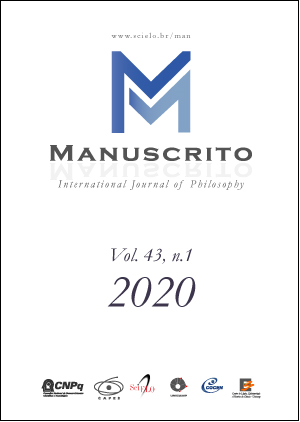Resumen
Em um argumento provocador, ainda que pouco discutido, no final de Knowing Full Well, Ernest Sosa tentou determinar que tipo de evidência possuímos para apoiar a crença de que nossas capacidades cognitivas como seres humanos são confiáveis. Segundo Sosa, podemos recorrer a considerações de coerência para provar que essas capacidades são confiáveis (ou seja, seria epistemicamente derrotista pensar de outra maneira). No entanto, Sosa também declara que tais considerações não são razões "determinantes, ultima facie" - ou seja, elas devem ser consideradas viáveis. Como tentaremos ressaltar, essa estratégia geral é incoerente. Além disso, como argumentaremos,
Citas
GARCIA, J., MCGOWAN, B. K., & GREEN, K. F. (1972). Biological constraints on conditioning. In A. Black & W. F. Prokasy (Eds.), Classical conditioning (Vol. 2, pp. 3-27).
GÓMEZ ALONSO, M. M. (2019). Wittgenstein y el impacto de Sobre la certeza en la epistemología contemporánea. In D. Pérez-Chico (Ed.), Wittgenstein y el escepticismo. Certeza, paradoja, locura.
LACKEY, J. (2008). Learning From Words: Testimony as a Source of Knowledge. Oxford: Oxford University Press.
NETA, R. (2016). How Holy is the Disjunctivist Grail? Journal of Philosophical Research, 41.
PLANTINGA, A. (1993). Warrant and Proper Function. Oxford University Press.
SILVA, P. (2013). Epistemically self-defeating arguments and skepticism about intuition. Philosophical Studies: An International Journal for Philosophy in the Analytic Tradition, 164(3), 579-589.
SOSA, E. (1994). Philosophical Scepticism and Epistemic Circularity. Proceedings of the Aristotelian Society, Supplementary Volumes, 6, 263-307.
SOSA, E. (1997a). How to Resolve the Pyrrhonian Problematic: A Lesson from Descartes. Philosophical Studies: An International Journal for Philosophy in the Analytic Tradition, 85(2/3), 229-249. Retrieved from JSTOR.
SOSA, E. (1997b). Reflective Knowledge in the Best Circles. Journal of Philosophy, 94(8), 410.
SOSA, E. (2002). Plantinga’s evolutionary meditations. In J. K. Beilby (Ed.), Naturalism defeated (pp. 91-102).
SOSA, E. (2009). Reflective Knowledge: Apt Belief and Reflective Knowledge. OUP Oxford.
SOSA, E. (2010). Knowing Full Well. Princeton University Press.
STICH, S. P. (1985). Could Man Be an Irrational Animal? Some Notes on the Epistemology of Rationality. Synthese, 64(1), 115-135.


